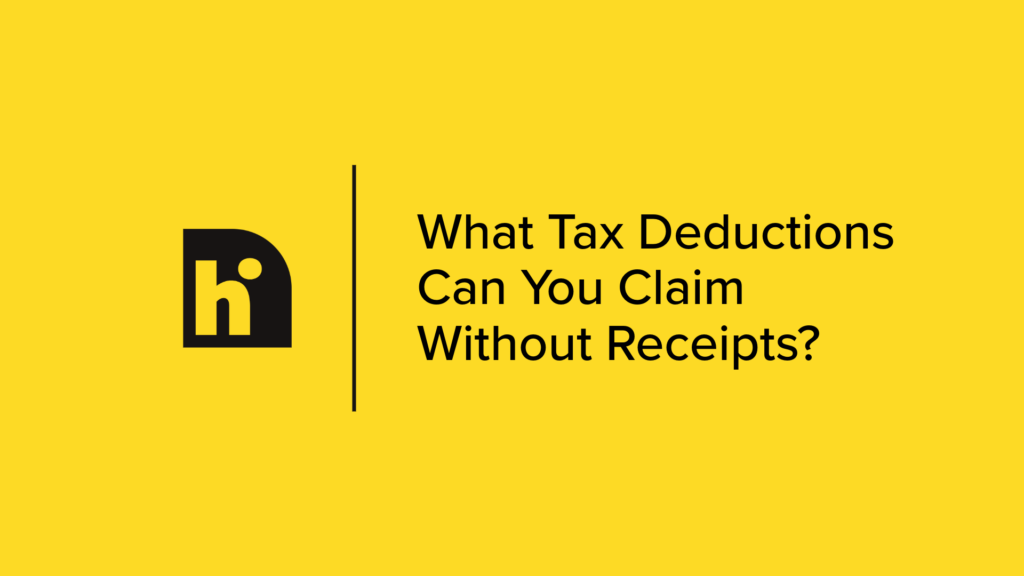What Tax Deductions Can You Claim Without Receipts?
Written by Sarah Dillon | Published: April 8, 2024
Sign up for our newsletter to receive everything from accounting advice to notifications on new tax laws.

What tax deductions can you deduct without receipts? It’s the question on everyone’s lips when they’re trying to reduce their tax bill for the year. Thankfully, the IRS does allow businesses to claim certain deductions without physical proof of receipts. In this guide, we’ll show you what they are and how to claim them responsibly.
Before you add any of these deductions to your tax return, speak to your accountant to confirm that they are available to your business.
Key Takeaways
- Taxpayers can claim certain deductions without physical receipts by using alternative documentation or standardized IRS calculations. Such deductions include business use of a vehicle, home office expenses, and self-employed health insurance premiums.
- Where possible, you should always keep receipts for every business expense that you plan to deduct on your taxes. Receipts will make an IRS audit a whole lot easier.
- The IRS allows the standard deduction to be taken without itemized deductions and requires alternative forms of documentation, like bank statements and logs, in instances where detailed receipts are not achievable.
List of Tax Deductions You Can Claim Without Receipts
Cell Phone Expenses
If you use your personal cell phone for business purposes, you can likely deduct a portion of the plan as a business tax deduction.
To calculate this deduction, multiply the cost of your monthly cell phone plan by the percentage you use for business. For example, say you use your cell phone for business purposes 40% of the time, and the monthly plan costs $100.
$100 (plan cost) x 40% (total business usage) = $40 (your monthly business tax deduction is $40).
Charitable Contributions
Charitable contributions serve a dual purpose—benefiting the community and offering tax benefits for businesses. Businesses are allowed to deduct charitable contributions from their taxes. For donations over $250, the IRS requires a written acknowledgment from the charity instead of a physical receipt.
Both LLCs and corporations can utilize this method for deducting charitable contributions on their respective tax forms.
Home Office Deductions
If you operate a home-based business, you may be able to deduct a portion of your home office expenses—rent, utilities, insurance, mortgage, real estate taxes, and more—using the home office deduction.
The simplified home office deduction method allows to claim $5 per square foot and is applied to a maximum area of 300 square feet, making the maximum available deduction $1,500.
While you don’t need receipts to claim most home-office related expenditure, try and keep other documentation on hand—bank statements or canceled checks proving rental, mortgage, and utilities bill payments, a copy of your rental agreement, etc.
Retirement Plan Contributions
Business owners can contribute to retirement accounts such as a traditional IRA, SEP-IRA, or solo 401(k) to reduce their taxable income. These contributions are reported on Form 5498 and can be deducted without needing to present receipts.
Partnerships can deduct contributions made to retirement plans like a 401(k) directly from income. Such deductions do not require receipts as they are recorded through the retirement plan administration.
Self-Employment Taxes
Self-employed filers are responsible for paying their own Medicare and Social Security taxes. Often referred to as self-employment taxes, you can typically deduct half of these from your income. No receipt required.
Self-Employed Health Insurance Premiums
If you’re self-employed and you pay for health insurance for yourself, your spouse, or your dependents, you can write these costs off as tax deductions. If you don’t have receipts to back up this expenditure, you can use a copy of your health insurance premium policy’s declarations page. Alternatively, use the payment history found in your insurer’s website as proof of payment.
Vehicle Expenses
If you use your personal vehicle for business purposes, you can claim the cost of gas, depreciation, and repairs on your tax return. The simplest, receipt-free way to claim these deductions is to use the standard mileage rate to calculate vehicle-related work expenses
In lieu of receipts, you’ll need to keep a mileage log that records:
- Dates
- Destinations
- Trip purposes
- Total miles driven for the year
This information substantiates the deduction. For the year 2023, the standard mileage rate for self-employed or business use of a vehicle is set at $0.655 per mile.
Remember: if you use the vehicle for both business and personal purposes, you can only claim tax deductions for the miles you drive for business-related purposes. That’s why it’s essential to keep track of how many miles you drove for business-purposes throughout the year.
Advanced Deductions: Credits and Incentives
Beyond the fundamental deductions, a variety of advanced tax deductions, credits, and incentives are available to help reduce the federal income tax bill without the need for itemized deductions. These include the:
- Earned Income Tax Credit: Targeted at low to moderate-income workers, especially those with children, the EITC provides significant tax relief without the need for receipts.
- Child and Dependent Care Credit: Available for taxpayers without presenting receipts to offset the costs of childcare or dependent care when they are working or job hunting.
- Green energy incentives
- If a federally declared disaster strikes, taxpayers can deduct casualty, disaster, and theft losses without receipts, as long as these exceed 10% of their adjusted gross income (AGI).
Employee Retention Credit: An Overview
The Employee Retention Credit is a refundable tax credit for eligible businesses that compensates for qualified wages, including specific health insurance costs, during the COVID-19 pandemic. Businesses are eligible for the ERC if they were affected by government orders (full or partial suspension) or experienced a significant decline in gross receipts. This credit is not available to individuals.
The ERC, available for wages paid from March 12, 2020, to September 30, 2021, granted a 50% credit for 2020 and a 70% credit for 2021, up to $10,000 in qualified wages per employee per time period, with special terms for Recovery Startup Businesses. The IRS provides a Document Upload Tool, which can be used to apply to programs like the Employee Retention Credit Voluntary Disclosure Program.
Green Energy Incentives for Businesses
Green energy incentives can provide substantial tax benefits for businesses. The Investment Tax Credit (ITC) reduces federal income tax liability based on a percentage of the cost of a qualifying solar system installed during the tax year.
Solar systems eligible for the 30% ITC or 2.75 ¢/kWh PTC include those starting construction before 2033 or those under 1 megawatt in size. This is provided they comply with labor requirements or start service in 2022 or later.
Eligible expenses for the ITC calculation encompass:
- solar panels
- inverters
- racking
- installation costs
- qualifying energy storage devices
- certain indirect costs
Additionally, projects 5 MW or less can include interconnection property costs in the ITC, aiding in the electricity distribution and transmission from the system.
The Production Tax Credit (PTC) provides a tax credit for every kilowatt-hour of electricity generated by solar and other qualifying systems for the first ten years, with an annually inflation-adjusted rate.
Complying with labor requirements by paying prevailing wages and using apprentices can grant projects additional ITC or PTC credits.
Can you use bank statements for deductions that do require receipts?
Bank statements typically aren’t enough to substantiate a tax deduction because they lack the specific details that the IRS needs to see—name of payee, amount paid, date incurred, and a description of the item or service that proves the expenditure was a business-related expense.
For example, a bank statement will demonstrate that you paid $275 at OfficeWorks. But it won’t indicate whether the items you purchased were for personal or business-related purposes.
If you don’t have a receipt, what other tax return documentation can you use?
When you don’t have receipts, try to gather as much supplementary information as you can. Things like:
- Invoices
- Bills
- Account statements
- Purchase and sales invoices
- Contracts
- Transaction histories
- Detailed logs for certain expenses
- Canceled checks
- Bank statements
- Calendars that document business travel and client meetings
- Cell phone bills
- Detailed mileage logs
- Diaries
- Copies of credit card statements
- Copies of airline tickets
Stress-Free Tax Filing: How Hiline Can Help
If you need some help with your taxes this year, chat with a Hiline advisor and see how we can help. With Hiline, you get a dedicated team of financial pros to manage your business’s back office—bookkeeping, accounting, tax filing, and year-round strategic financial support.
We can help identify all of the deductions available to your business, minimize your taxable income for the year, and provide the financial expertise you need to make your business grow.
Frequently Asked Questions
Can you deduct expenses without receipts?
No, you cannot deduct expenses without receipts for tax purposes. While you can claim business expenses without receipts, personal costs cannot be claimed as IRS deductions.
What personal expenses are tax deductible?
You can deduct personal expenses such as medical expenses, charitable contributions, and childcare expenses, subject to limitations. These expenses can be deducted whether you itemize or take the standard deduction.
What are the maximum deductions I can claim?
You can claim a combined total deduction of $10,000 ($5,000 if married filing separately) for state and local income, general sales, and property taxes. Some of your other itemized deductions may also be limited.
How does the standard deduction simplify tax filing?
The standard deduction simplifies tax filing by reducing taxable income without the need to itemize deductions or present receipts. It is a fixed amount of income that is not taxed.
What services does Hiline provide to businesses?
Hiline provides professional bookkeeping and tax experts to businesses, categorizes business expenses, and ensures timely tax submissions, helping businesses manage their financial responsibilities effectively.
Share this article
Read Similar Articles

Tax
Why Summer is the Perfect Time to Get Your Financial Ducks in a Row

Tax
2024 Business Tax Deadlines You Need To Know
